

Twin Sons of Different Mothers.....
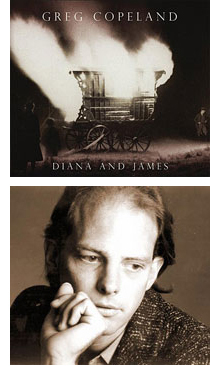 Even
if you have a solid knowledge of the artistic life in Southern
California between 1965 and 1975, you have a good excuse for not
knowing who Steve Noonan and Greg Copeland are. In fact, both had
published only one album, in 1968 and 1982 respectively, until they
show up again in the fall of 2008 with brand new albums, published
under quite different conditions :
Even
if you have a solid knowledge of the artistic life in Southern
California between 1965 and 1975, you have a good excuse for not
knowing who Steve Noonan and Greg Copeland are. In fact, both had
published only one album, in 1968 and 1982 respectively, until they
show up again in the fall of 2008 with brand new albums, published
under quite different conditions :
Noonan recorded his
album in his home studio, while Copeland’s is released on Jackson
Browne’s Inside Recordings label. And while their high-school mate is
himself releasing a new album these days, here is a unique opportunity
to meet these two Californian songwriters with somehow chaotic paths
but who share several common points: first, if you look closely, both
have played quite a part in launching the career of the
man-on-whom-Time-the-Conqueror-seems-to-have-no-impact; second, their
songs have been covered by famous artists such as the Nitty Gritty Dirt
Band, Nico, David Lindley and of course Jackson himself; and last but
not least, their new albums deserve the attention of anybody who’s
interested in superior songwriting.
Ladies and Gentlemen, please welcome Steve Noonan and Greg Copeland!
Your names are often associated with Jackson Browne. How did you meet him? What is your story with him?
GC - I met Jackson through Steve and Jackson’s sister. Steve was the
hub for the musical wheel at our high school, along with the late Steve
Van Gelder, who played great banjo to Noonan’s guitar. In fact, Noonan
was the first person I ever saw playing a guitar live. I can still feel
the impact of him sitting in the passenger’s seat of my ’57 Ford,
playing what was probably a brand new Martin D-18 about two feet away
from me. It went right through my body and apparently shook up my DNA.
Before that moment I had no desire at all to write songs, but Noonan
changed all that. Then Jackson started writing and the jig was up.
Jackson was really something special?
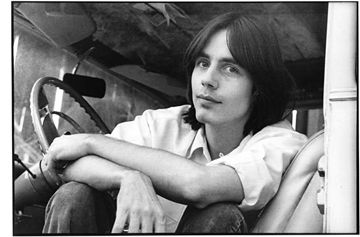 GC
- Anybody with any sense could hear that he was special, right from the
beginning. Even his early songs were way ahead of what was on the radio
or in the clubs at that time. A couple of years later, he and I drove
straight from LA to New York with Adam Saylor, for whom he wrote Song
for Adam, to see Noonan, and that drive was peppered with great
fragments of songs that Jackson was working on. I remember pulling off
the road to take a break way out in the middle of nowhere and Jackson
took out his guitar, stood right by the side of the road and played an
early version of “I’ve Been Out Walking”, that was to bebcome “These
Days”. That was it for me. I could tell he was going to be just fine.
And all three of us have been joined at the brain ever since.
GC
- Anybody with any sense could hear that he was special, right from the
beginning. Even his early songs were way ahead of what was on the radio
or in the clubs at that time. A couple of years later, he and I drove
straight from LA to New York with Adam Saylor, for whom he wrote Song
for Adam, to see Noonan, and that drive was peppered with great
fragments of songs that Jackson was working on. I remember pulling off
the road to take a break way out in the middle of nowhere and Jackson
took out his guitar, stood right by the side of the road and played an
early version of “I’ve Been Out Walking”, that was to bebcome “These
Days”. That was it for me. I could tell he was going to be just fine.
And all three of us have been joined at the brain ever since.
SN – Actually, it was my first guitar, a D-28 I bought in 1963. Greg
and I were writing together in high school in 1963-4 and “Jackie” was
in a couple grades below us, and just starting his pursuit of music,
guitar and writing. I was going out with his sister and he sort of
“tagged along” when we went and played at venues around Orange County
and Los Angeles. Jackson watched what we were doing and felt he could
do it as well.
The “Orange County Three” tag dates back from that period?
SN – A little later, in January 1968. The Orange County Three was an
invention of Tom Nolan, a writer at Cheetah Magazine and it was pretty
cool – Tim Buckley, Jackson and me – not a bad idea – perhaps some
record company should have DONE something with it?
Instead, you have released a solo album…
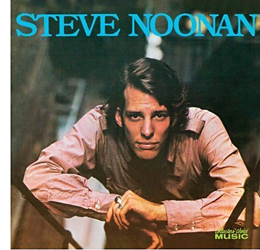 SN
- In 1967 Elektra Records thought it was time to put out an album – I
perhaps wasn’t quite as knowledgeable, or as ready as I might have been
– and I am much more a-tuned to what I need to do now to present my
music in the right light than I was then, but when opportunity knocks
you must answer. The Elektra deal was a one record deal, and when they
lost interest in the first album, and let it “die on the vine” I had no
interest in moving further with them.
SN
- In 1967 Elektra Records thought it was time to put out an album – I
perhaps wasn’t quite as knowledgeable, or as ready as I might have been
– and I am much more a-tuned to what I need to do now to present my
music in the right light than I was then, but when opportunity knocks
you must answer. The Elektra deal was a one record deal, and when they
lost interest in the first album, and let it “die on the vine” I had no
interest in moving further with them.
You have
written many songs together. How did your songs end up being recorded
by famous acts such as the Nitty Gritty Dirt Band, and even Nico.
GC - The NGDB probably heard “Buy For Me the Rain” from Noonan singing
it in a club. The Dirt Band, Noonan, Jackson, Tim Buckley, etc., all
sang in the same network of folk clubs during that time period, and
“Buy for me the Rain” was a mainstay in his set, so I would guess the
Dirt Band heard that song several times before it was recorded by
anyone. Nico undoubtedly heard “Fairest of the Seasons” directly from
Jackson. The Jackson/Nico drama happened in NY while Adam and I were
out traveling, so I missed the entire thing. I guess you never know
where a REAL adventure will happen.
Didn’t you ever think about recording an album together?
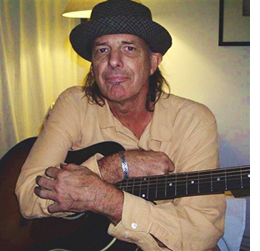 GC - We’ve always been really close. Noonan is like my brother, but we’ve been writing in our own rooms.
GC - We’ve always been really close. Noonan is like my brother, but we’ve been writing in our own rooms.
SN - We had a wonderful time working together all the way through the
Elektra LP (1968) and little after – then we just went on to other
things (we both were married in the years following our returns to the
LA area) and still appreciate each others projects with great respect.
We have not had any discussions about doing an album together – it
seems we are doing pretty well separately, and have had a good deal of
success writing separately about whatever issues we find in life to
write about.
GC - I didn’t really write many songs between high school days and the
early 80’s. I travelled a lot, worked a bit, travelled some more, then
went back to university to study English and American poetry, and then
went to graduate school. After I left grad school I started writing
songs again as a kind of exercise. I wanted to write, but I didn’t know
what form it would take. I have this thing about singing – I have a
really hard time singing if the song isn’t about something that comes
straight out of my spine. So I decided to test what I was writing by
writing songs and not just poems. I figured that if I could actually
sing it out loud, it was probably the truth (at least for me); and if I
couldn’t bring myself to sing it, it was probably something less than
that. So I wrote some songs in my head and made little a cappella
reference tapes sitting in my car in a parking lot.
This is the way 'Revenge Will Come' was conceived?
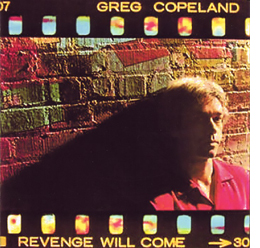 GC
- "Revenge Will Come” was sort of a fluke. When I sent the my a
cappella tapes to Jackson just to see what he thought of the songs,
David Geffen was just starting up Geffen Records and was signing new
artists. Jackson is a pretty persuasive guy, and he somehow talked
Geffen into signing me. He called in people from his own band to play.
We rehearsed for one day and then started recording. I pretty much just
showed up and sang. The critics liked the record a lot, but it was not
a commercial success by any means. Paul Nelson of Rolling Stone was a
real fan of that record. We did a long interview, which he apparently
intended to publish in Rolling Stone, but he left RS shortly after we
spoke and his article never appeared. That might have made a huge
difference, but it was not to be. This was all happening at the time
that MTV was starting to come into its own, and disco was the big new
influence (remember, the biggest band in the US at that time was
Kajagoogoo), so “Revenge Will Come” was completely out of step with
what the “industry” was interested in, and it died a quiet death. The
record has never come out in CD format, only vinyl, and there can’t be
more than a dozen copies out there on the market. Talk about obscure.
GC
- "Revenge Will Come” was sort of a fluke. When I sent the my a
cappella tapes to Jackson just to see what he thought of the songs,
David Geffen was just starting up Geffen Records and was signing new
artists. Jackson is a pretty persuasive guy, and he somehow talked
Geffen into signing me. He called in people from his own band to play.
We rehearsed for one day and then started recording. I pretty much just
showed up and sang. The critics liked the record a lot, but it was not
a commercial success by any means. Paul Nelson of Rolling Stone was a
real fan of that record. We did a long interview, which he apparently
intended to publish in Rolling Stone, but he left RS shortly after we
spoke and his article never appeared. That might have made a huge
difference, but it was not to be. This was all happening at the time
that MTV was starting to come into its own, and disco was the big new
influence (remember, the biggest band in the US at that time was
Kajagoogoo), so “Revenge Will Come” was completely out of step with
what the “industry” was interested in, and it died a quiet death. The
record has never come out in CD format, only vinyl, and there can’t be
more than a dozen copies out there on the market. Talk about obscure.
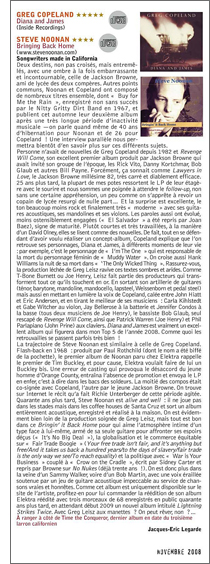 You are both releasing a new album in 2008. What made it possible that you’re back in the saddle so many years later?
You are both releasing a new album in 2008. What made it possible that you’re back in the saddle so many years later?
SN – I felt pretty useless - music-wise for much of the time between
1968 and 2008 - with a few months every few years or so when I would
write or perform - but I couldn't really get a handle on new material
that I thought was GREAT. I worked in just about ever kind of sales job
- and hated every minute of it. After the Paradox Reunion Concerts in
Sept 2007 (where I rocked!! - see videos on myspace.com - also up on
you tube shortly) I came home and packed up my stuff and moved out of a
24 year marriage and started witting like a FULL TIME SONGWRITER – More
than 20 songs later I am feeling like I can really present something of
real value to the world. I am writing now, in 2008, because I am “Back
on the Block” as a great Jazz player would say, and excited to be able
to share new insights as they come down the pipe..
GC - I quit writing completely in 1983. I had to support my family, so
I put my head down and worked at a grown-up job for the next 17 years.
Then in early 2000 a friend of mine asked me why I wasn’t writing songs
any more and I had to consider the question. It’s funny, just thinking
about the issue sort of woke up the process. It took me a couple of
years to thaw out, and then real songs started showing up. In mid-2003,
I was leaving one job and starting another, and I gave myself 100 days
to do nothing but write. I had never done that before, and it changed
everything because I didn’t have to keep putting the brakes on when the
weekend was over. Most of the songs on “Diana and James” came out of
that 100-day period. They showed up in a rush of fragments and it took
a while for me to see what had happened. I was working with a real
primitive 4-track, so every time I finished a song I took my scratchy
little tape over to Noonan’s house. He had a nice home studio, so he
was able to fashion them it into something listenable. And those tracks
became the demos for “Diana and James”. Jackson heard some of the early
ones and introduced me to Greg Leisz while I was still in writing mode,
and he was the real godfather of the record. He was able to hear
through my mistakes and see what the songs were about. As a producer,
Leisz is right there with T-Bone Burnett and Joe Henry in terms of
finding the real essence of a song. He simply can’t abide anything in a
track that doesn’t need to be there. So we gathered up an incredible
bunch of musicians and recorded the songs for real when people were
available. We’d go in for a couple of days, wait another few months,
and then go back in for another couple of days. It took forever, but
all the songs turned out just the way we heard them in our heads.
Where do the new songs come from?
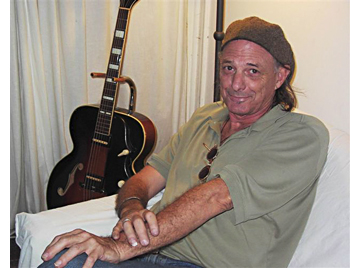 SN
- I started listening to the powers around me - and to my inner voices.
They told me to be OPEN to new opportunities and situations, and to
WRITE about them. When things happened with my relationships – both
Good and Bad – I tried to define them, and explain them to myself in
song. Quite frankly, had I not been able to “voice” these issues - put
them in songs that could help “explain” the issues to me - I would not
be in as solid a place as I am now.
SN
- I started listening to the powers around me - and to my inner voices.
They told me to be OPEN to new opportunities and situations, and to
WRITE about them. When things happened with my relationships – both
Good and Bad – I tried to define them, and explain them to myself in
song. Quite frankly, had I not been able to “voice” these issues - put
them in songs that could help “explain” the issues to me - I would not
be in as solid a place as I am now.
GC - “Diana and
James” is not really a concept album – all of the songs are
free-standing stories – but the songs have a lot of interconnections.
For example, as I think you know, the guy in “I Am The One” is the guy
who is responsible for the death of the woman in “Muddy Water”, but
it’s not clear what he did to cause her death. Murder? Suicide? You
tell me. Both Diana and James are fictional characters but they come
directly out of my own domestic life. The time keeps jumping backwards
and forwards – it’s not a linear narrative. Have you ever seen Bob
Dylan’s indie movie “Renaldo and Clara”? In that movie the actor
playing the character of Renaldo changes from scene to scene, but you
gradually notice that someone in every scene is wearing a hat – and
THAT is Renaldo in his various forms. It’s kind of the same with the
characters in “Diana & James”.
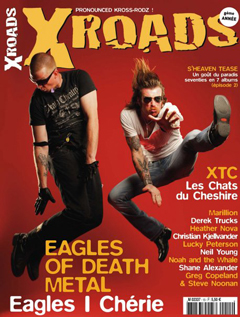 Do you perform live?
Do you perform live?
GC - Other than literally one song that I wrote and sang for my
girlfriend in a club in 1966, I have never performed live. I’m actually
starting to think about it now, but that's another story alltogether.
But Noonan does that pretty well. I’m writing the next record right
now, and that’s taking every brain cell I have. Trying to play live at
this point would make my head explode.
SN - I play in as many “quiet” listening venues as I can find. I have
Long since given up playing in bars, restaurants, or other places where
people congregate to party or do something besides LISTEN to the music.
There are places where people come primarily to HEAR the music, because
it has importance to them – that’s where am. I take the path of least
resistance. I am not going out and trying to 'sell' my live performance
in a venue where my very personal - somewhat quieter style - would not
be well received - or not even Heard over the noise - too much work for
me and a lower likely-hood of success.
I hope we won’t have to wait for as long to hear your new record!
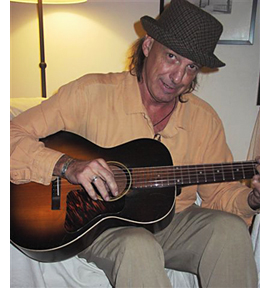 GC
- I’m almost finished writing the next record now, and it is really
intended as the second act. “Diana & James” is Act I; the next
record is Act II and it has the same kind of cubist logic to the
narrative. In any event, I’m going to leave it to the listener to
discover the interconnections. But there are a lot of them. I’m still
discovering them myself.
GC
- I’m almost finished writing the next record now, and it is really
intended as the second act. “Diana & James” is Act I; the next
record is Act II and it has the same kind of cubist logic to the
narrative. In any event, I’m going to leave it to the listener to
discover the interconnections. But there are a lot of them. I’m still
discovering them myself.
SN - Right now “Lightening
Strikes Twice “is conceived as a more arranged, more produced version
of “Bringin’ It Back Home”. It will contain some of the same tunes -
with some songs omitted, and some newer ones added, with
instrumentation. Kenny Edwards, a multi-instrumentalist who has worked
with Linda Ronstadt, Warren Zevon and J D Souther could be a possible
producer the album. Funding will be an essential part of that process,
and we are seeking that now, and are open to suggestions.
- Sincere thanks for the interview to Jacques-Eric Legarde and Xroads Magazine -
![]()